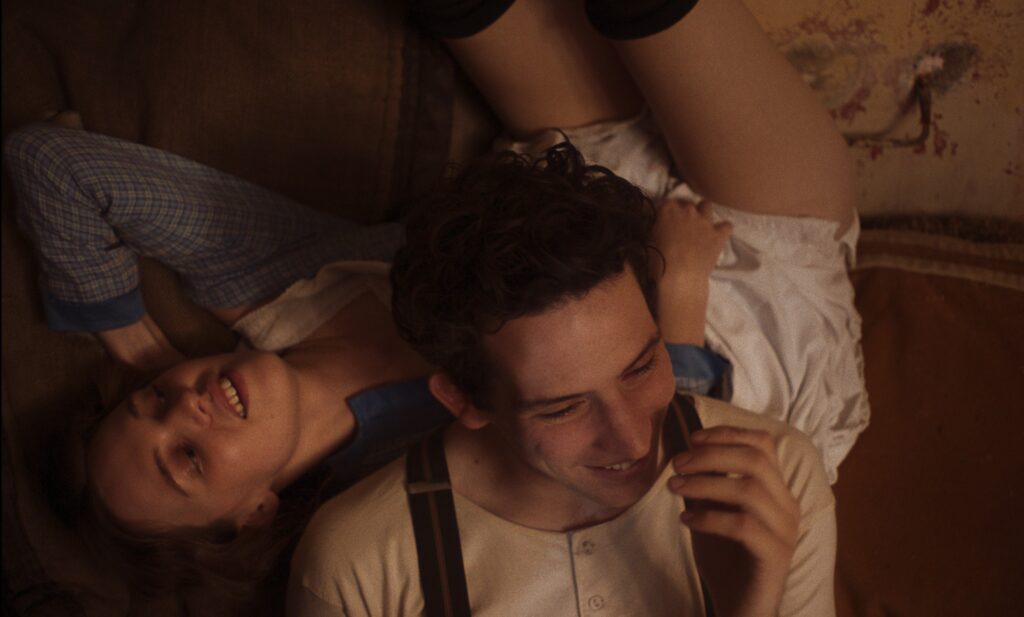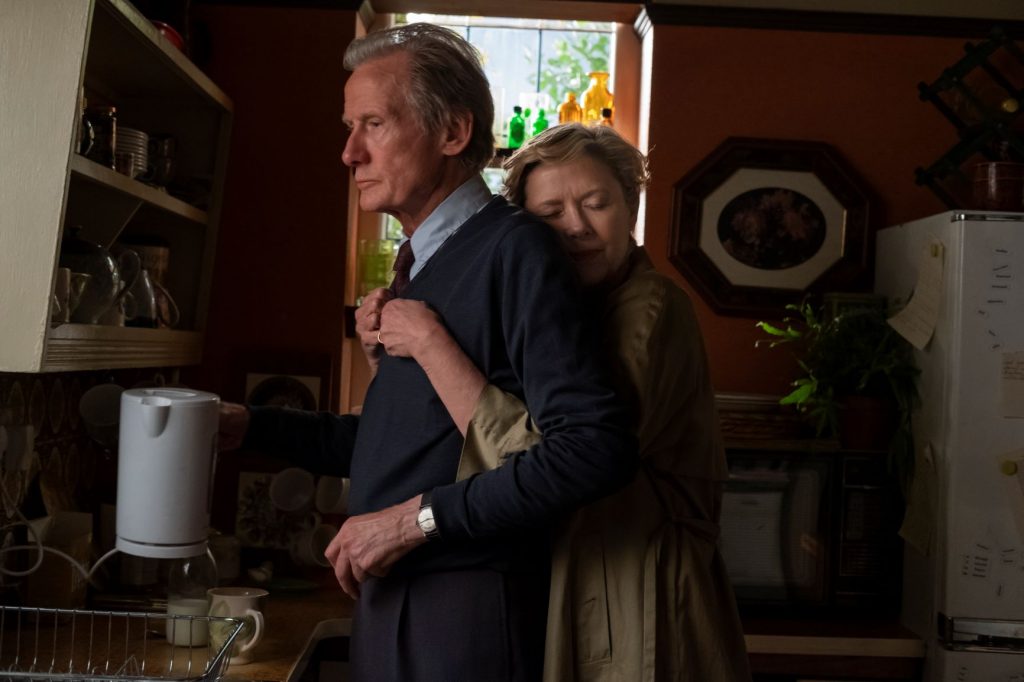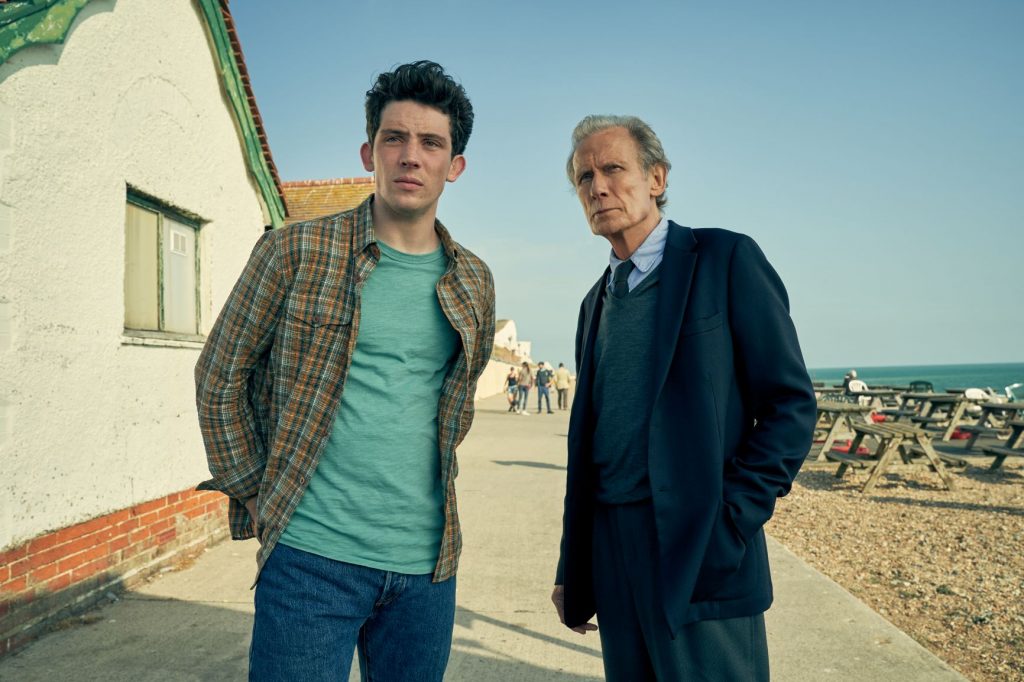April 21, 2024
by Carla Hay

Directed by Luca Guadagnino
Culture Representation: Taking place from 2006 to 2019, in various parts of the U.S., the dramatic film “Challengers” features a predominantly white cast of characters (with some African Americans) representing the working-class, middle-class and wealthy.
Culture Clash: A love triangle set in the world of tennis becomes a high-stakes game of loyalty and career ambitions during a tennis challenger tournament.
Culture Audience: “Challengers” will appeal primarily to people who are fans of the movie’s headliners, director Luca Guadagnino and suspenseful movies about love triangles and tennis.

Set in the competitive tennis world, “Challengers” is a stylish and tension-filled depiction of games played on and off the court during a longtime love triangle. It’s a well-acted drama with twists, turns, and teases leading to an unpredictable ending. How the movie ends will either intrigue or disappoint viewers. “Challengers” is not a typical tennis film, but it does have some predictable clichés about a seductress who plays two men against each other for her own selfish reasons.
Directed by Luca Guadagnino and written by Justin Kuritzkes, “Challengers” is Kuritzkes’ first feature film as a screenwriter, after years of experience as a playwright. The story is best suited to be on screen, not just because of the tennis matches depicted in the movie but also because the story jumps back and forth in a timeline that spans from 2006 to 2019. Some viewers won’t like how this story is told in non-chronological order. However, these flashbacks and flash forwards are necessary to unfold the layers of the story’s love triangle in a suspenseful way.
“Challengers” begins in 2019, by showing an intense tennis match for men’s singles at the New Rochelle Challenger in New Rochelle, New York. The players are Art Donaldson (played by Mike Faist) and Patrick Zweig (played by Josh O’Connor), two former best friends whose lives and careers have gone in very different directions. Watching apprehensively in the stands is Tashi Donaldson (played by Zendaya), Art’s wife, who is also Patrick’s ex-girlfriend. Flashbacks that begin in 2006 show exactly what led up to this match and what is at stake.
In the production notes for “Challengers,” Kuritzkes says a big inspiration for the “Challengers” screenplay was the controversial 2019 U.S. Open match between Serena Williams and Naomi Osaka, when Williams was accused of getting coaching from someone in the audience, among other violations. Throughout the movie, it’s made obvious that Tashi (who is Art’s tennis coach for most of the story) likes to be in control and often manipulates people to do what she wants. “Challengers” keeps viewers guessing about not only who will win this match but also who will really “win” in getting what they want in life.
As the various parts of the story emerge in a non-linear way, viewers have to put together the story like pieces of a puzzle. It’s enough to say some details in this review without giving away too much information. Tashi, Art and Patrick met in 2006, when they were all 18 years old. Over the next 13 years, their lives intertwined, clashed, and drifted apart in many ways. The New Rochelle Challenger match is a culmination and a crucial turning point for Tashi, Art and Patrick.
At the time the people in this love triangle met in 2006, Tashi was a student at Stanford University and a rising star on the U.S. college tennis circuit. Tashi (whose maiden surname is Daniel) was considered a tennis prodigy and expected to eventually become a high-ranking professional tennis player and probably a superstar in tennis. Instead of becoming a professional tennis player right out of high school, Tashi decided to go to a university to learn to do other things in her life besides tennis. However, it’s obvious that tennis is her only real passion.
Of the three people in this love triangle, only Tashi (who has no siblings) is seen with her family members. Her parents, whose names are not mentioned in the movie, are very involved in her career and seem to be loving and devoted parents in a solid marriage. Tashi’s father (played by Naheem Garcia) is her coach, while her mother (played by Nada Despotovich) seems to provide administrative support. Both of Tashi’s parents are only tangential characters to the story, which is mostly focused on the Tashi, Patrick and Art.
Patrick and Art, who attended a tennis boarding school together, were best friends and friendly rivals since they were 12 years old. Before Patrick and Art became estranged from each other, they had a relationship that they described as “brotherly.” In boarding school, Patrick and Art excelled in doubles tennis and were nicknamed Fire & Ice. It’s easy to tell who is the “fire” and who is the “ice” in the relationship.
Patrick is outgoing, impulsive and rebellious. Art is reserved, disciplined and obedient. Although Patrick has a “bad boy” personality and Art has a “good guy” personality, they both work well together and treat each other like family members. But there comes a time when their relationship becomes so broken, they eventually no longer talk to each other. This estrangement has mostly to do with Tashi.
It’s revealed much later in the movie that Patrick comes from a wealthy family, so his teenage plans to be a professional tennis player isn’t so he can become rich. Art’s family background is not mentioned at all, but it’s implied that Art’s tennis goals are much more motivated by money than Patrick’s tennis goals. Patrick and Art want to be famous tennis champions, of course, but Art proves to be more ambitious in his career than Patrick.
By the time Patrick is doing this New Rochelle Challenger, he’s so broke, he can’t even afford a motel room and is too proud to ask anyone he knows for financial help. Patrick (who is a bachelor with no children) sleeps in his car, or he resorts to picking up women whom he meets on dating apps, in order to find a place to stay for the night. One of the biggest flaws in “Challengers” is that it doesn’t show Art, Patrick or Tashi having any close friendships in their lives except with each other. The movie looks a bit unrealistic because of this ommission.
Observant viewers will notice in the scenes where Art and Patrick are teenagers, they move with the exuberant energy of young people who are very optimistic about their futures. Patrick and Art also tend to move in sync, like best friends or siblings who are very close to each other. As they get older, the body language movements of Art and Patrick change to being more world-weary and more cynical about life. It’s an example of the admirable acting by Faist and O’Connor how they can convincingly portray the physical and emotional metamorphoses of these characters over a 13-year time span, from late teens to early 30s.
Tashi is portrayed as someone is who obsessed with tennis as a sport and as a business, to the point that she has made tennis the most important thing in her life. She is calculating and power-hungry, but she’s not an evil person. Although she began playing tennis at a very young age, Tashi doesn’t appear to be someone who was brainwashed by her parents to let tennis take over her life. There are choices she makes as an adult that reflect the domineering personality that she has, with or without tennis.
When Patrick and Art are 18 years old, they see Tashi play and win the 2006 U.S. Open Junior championship. Art and Patrick are instantly smitten with Tashi and want to meet her. They get their chance at the after-party to celebrate Tashi’s victory. She can instantly sense that Art and Patrick are attracted to her and will most likely compete with each other to win her affections. She uses this rivalry to her advantage.
At first, Tashi is coy and flirtatious with Art and Patrick. A pivotal scene is during the night that they all meet each other, when Tashi surprises Art and Patrick by showing up at their hotel room, after she initially declined their invitation to meet up at the hotel after the party. What happens in that hotel room sets the tone for the rest of this love triangle.
The trailers for “Challengers” make it look like this could be a sexually explicit movie, but it’s actually not sexually explicit, although the movie is definitely geared to mature audiences. There is no nudity during any love scenes. And the “erotic” content is mostly people kissing passionately, sometimes scantily clad. There is no threesome sex between Tashi, Art and Patrick. And the nude scenes are brief non-erotic shots of male nudity in a locker room and a sauna.
What “Challengers” does to make the love triangle look interesting is keeping viewers on edge to see that Tashi will do next. It’s eventually revealed that Art fell in love with Tashi almost immediately, but Tashi chose to date Patrick instead during their late teens and early 20s. Art enrolled in Stanford University (no doubt to be closer to closer to Tashi), while Patrick skipped a college education to became a professional tennis player.
Patrick and Art are close, but there are some things that they don’t openly talk about with each other. For example, when Patrick and Tashi start dating each other, there’s a scene where Art and Patrick are playing tennis together, Art wants to know if Patrick and Tashi have had sex but Art doesn’t want to know all the details. Art tells Patrick that if Patrick and Tashi had sex, Patrick should serve the tennis ball in Art’s signature way: by putting the tennis all in the center at the top of the racket handle before serving the ball. This signature move becomes an important part of the story later in the movie.
As Patrick’s tennis career was taking off, his relationship with Tashi started to crumble. And it wasn’t because Patrick was probably cheating on Tashi with other women. Tashi doesn’t seem to care if Patrick is monogamous or not, but she does have a goal of her and Patrick possibly being a power couple in tennis. Ever the control freak, Tashi began to give Patrick unsolicited advice on how to handle his career. It leads to an argument where Patrick hisses at Tashi, “I’m your peer, not your fucking groupie or student!”
Later, Tashi has a career-ending leg injury during a college tennis match. Patrick is too busy with his career to really be there for Tashi, who goes through difficult and frustrating rehab therapy. Meanwhile, always-supportive Art gets closer to Tashi and becomes her best friend during and after her physical recovery.
Unlike Patrick, Art welcomes Tashi’s tennis advice. And when Tashi faces the reality that she can’t become a professional tennis player, Art asks Tashi to be his tennis coach, and she says yes. Art and Tashi eventually get married and have a daughter together named Lily (played by A.J. Lister), who is about 5 or 6 years old in 2019.
By 2019, Art is ranked in the top five worldwide in professional men’s tennis. Art and Tashi (who is Art’s coach/manager) are also a famous power couple in tennis. However, she is clearly unhappy in their marriage. None of this spoiler information, since it’s already revealed in the “Challengers” trailers that Art and Tashi are unhappily married and she had an injury that prevented her from becoming a pro tennis player.
What isn’t revealed in the “Challengers” trailers but what is necessary to know is why Art is playing at the lower level of this New Rochelle Challenger, which is a part of a tournament meant for second-tier professional tennis players who aren’t ranked in the top 100. It’s shown in an early scene in the movie that in 2019, Art has won almost every major tournament—the Australian Open, the French Open and Wimbledon—but has never won the U.S. Open, which is the last tournament in the Grand Slam calendar.
In professional tennis, a Grand Slam champion is someone who wins the Australian Open, the French Open, Wimbledon and the U.S. Open in one year. Art is thinking about retiring when his tennis matches are over for the year. Tashi is determined to have Art become a Grand Slam champion before he retires. However, on the U.S. Open tour in 2019, Art has been on a losing streak.
Tashi comes up with the idea for Art to boost his confidence by playing a challenger match, where it’s expected he can easily win against less-talented, lower-ranked players. Art thinks this type of challenger match is beneath him, but he reluctantly agrees to it since he always does what Tashi wants. Tashi has the type of personality where she tells Art he can decide what he wants to do, but she makes it clear which decision that he makes will satisfy her the most.
Tashi knows that Patrick has been on the challenger circuit for years, since Patrick never reached the career heights that Art did. What Tashi probably did not anticipate is that Patrick would advance far enough in the New Rochelle Challenger to end up playing Art in this particular match that is the linchpin for this story. During this match, the past and present for this love triangle collide.
Zendaya gives a riveting performance as the emotionally guarded but scheming Tashi. It’s left up to interpretation if Tashi is really capable of true love. She is a caring and attentive mother to Lily in the short scenes where Tashi is shown interacting with her daughter. Tashi also seems to have a good relationship with her parents. But did Tashi ever love Art or Patrick?
One of the most noticeable flaws about “Challengers” is that it barely shows or tells anything about who Art is apart from his relationships with Tashi and Patrick. There are multiple scenes of what Patrick does when he’s on his own, but that’s not the case with Art. It might be the “Challengers” filmmakers’ way of depicting Art as having a co-dependent personality, but it still makes his character not as well-developed as Tashi and Patrick. The movie has many unanswered questions about Art, his family and his background.
“Challengers” is more concerned about showing that there’s some unresolved sexual tension between Art and Patrick. Tashi can sense it when all three of them meet for the first time. During this first meeting, Tashi jokes that she doesn’t want to be a “homewrecker” for whatever relationship Art and Patrick are having. Patrick and Art quickly assure Tashi that they are interested in dating women, not men.
However, when all three of them meet up in the hotel room later that night, their three-way makeout session (which doesn’t turn into three-way sexual intercourse) shows that Patrick and Art might be sexually attracted to each other but won’t say so out loud. (This makeout session is already partially revealed in the “Challengers” trailers.) Patrick’s and Art’s possible unacknowledged bisexuality or queerness adds another layer of rivalry that Patrick and Art have over Tashi. When Tashi inevitably choses one guy over the other, are Art and Patrick jealous of each other, or are they jealous of Tashi?
Issues of class and race, which have big implications in an elitist sport such as tennis, are barely acknowledged in “Challengers.” On the night that Tashi, Patrick and Art first meet, Patrick and Art tell her about their shared background of going to the same boarding school and being roommates for years. Tashi quickly mentions that even if her parents could afford to send her to a boarding school in her younger years, they wouldn’t want to because it wouldn’t be safe for her. Patrick and Art both look confused by this comment, until Tashi (whose father is black and whose mother is white) gives them a look as if to say, “Because I would have to deal with entitled and harmful racists if I went to your type of boarding school.”
Later in the movie, when Tashi and Patrick are both 31, she has a conversation with him where she says, “I’m taking such good care of my little white boys.” It’s a remark that’s meant to be an insult but it comes across as empty and flippant, considering Tashi doesn’t even talk about being biracial or African American. And because there is no information about the socioeconomic status of Art’s family (such as if Art’s family could afford his boarding school expenses, or if his family needed financial aid), it’s not really clear how being a multimillionaire as a tennis star has affected or changed Art.
“Challengers” has a techno/electronica-heavy music score by Oscar-winning composer Trent Reznor and Atticus Ross. This score is a mixed bag and is most effective in ramping up the tension in many of the scenes. However, there are times when the score music becomes too loud and interrupts a scene in ways that don’t always fit the mood of the scene.
The tennis matches in “Challengers” are engrossing but filmed in inconsistent ways. Most of the matches are filmed similar to what might be seen on a sports telecast, without sports commentators. In a climactic scene at the New Rochelle Challenger, the match is filmed from the perspective of the players, so what’s seen on screen looks like what it would look like if the players were wearing cameras somewhere on their heads. The “Challengers” cinematography from Sayombhu Mukdeeprom might get mixed reactions, but it’s bold, and it takes risks that give this movie an artistic edge over most other tennis films.
Guadagnino and Zendaya are two of the producers of “Challengers,” which is Zendaya’s first movie where she is portraying someone in her 30s. Tashi’s age changes throughout the story, but she is emotionally stagnant when it comes to what she wants out of life: From the ages of 18 to 31, she is still obsessed with achieving greatness in tennis, by any means necessary. Beyond the usual questions about who will win in this New Rochelle Challenger and what will happen in this love triangle, “Challengers” invites viewers to ponder if the cost of letting your identity become consumed by one thing is worth it if you lose yourself in the process.
Amazon MGM Studios will release “Challengers” in U.S. cinemas on April 26, 2024.




